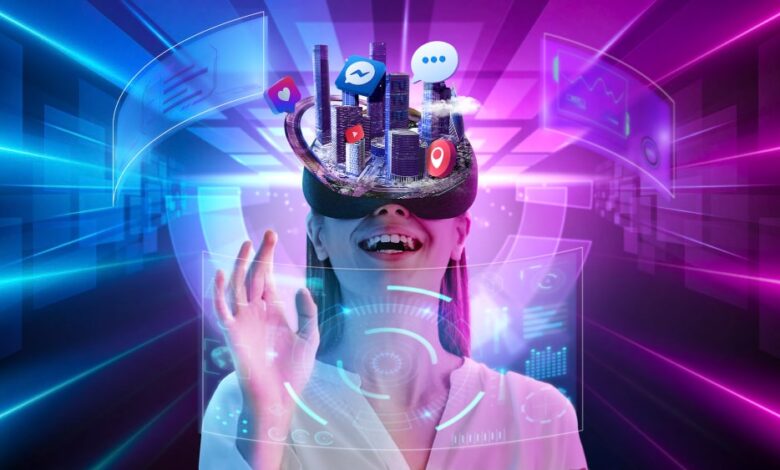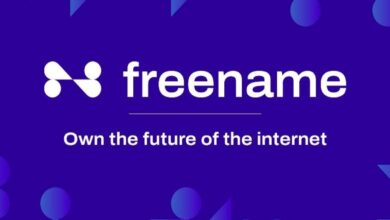Metaverse Concepts Unveiled: Exploring the Core Concepts of the Virtual Frontier in 2024

Introduction: Metaverse Concepts
In the ever-evolving landscape of technology, the Metaverse stands as a beacon of innovation, drawing both technophiles and casual users into its boundless realms. Defined as a collective virtual shared space that is created by the convergence of virtually enhanced physical reality and physically persistent virtual reality, the Metaverse is a multifaceted concept that has overwhelmed the digital world.
Table of Contents
Understanding the Metaverse: A Multidimensional Overview
At its core, the Metaverse is a vast, interconnected digital universe where users can interact with a computer-generated environment and other users in real time. It combines elements of augmented reality (AR), virtual reality (VR), and the internet to create immersive experiences. In the Metaverse, users can explore virtual worlds, interact with digital objects, and even socialize with others through digital avatars. This multidimensional approach provides a glimpse into the future of human-computer interaction.
Metaverse Concepts: Breaking Down the Terminology
To comprehend the Metaverse fully, one must unravel the intricate web of terminologies associated with this phenomenon. Let’s delve into some key concepts that form the foundation of the Metaverse:
1. Virtual Reality (VR):
VR refers to a computer-generated simulation of a three-dimensional environment that can be explored and interacted with by a person. It immerses users in a completely virtual world, shutting out the physical surroundings entirely.
2. Augmented Reality (AR):
AR overlays digital content onto the real world, enhancing the user’s perception of reality. Unlike VR, AR does not replace the real world but instead enriches it by adding digital elements.
3. Avatar:
In the context of the Metaverse, an avatar is a digital representation of a user. Users can customize their avatars, giving them unique appearances and personalities, and allowing for self-expression in the digital realm.
4. Blockchain Technology:
Blockchain plays a crucial role in the Metaverse by ensuring the security and authenticity of digital assets. It enables the creation of unique, verifiable digital assets, including virtual real estate, skins, and collectibles, fostering a sense of ownership in the virtual world.

For more detail visit: “Blockchain: A transformative technology underpinning the future“
5. Decentralized Autonomous Organizations (DAOs):
DAOs are entities represented by rules encoded as computer programs that transparently manage assets and make decisions through community consensus. In the Metaverse, DAOs enable democratic governance, giving users a say in the development and direction of virtual communities.
Metaverse in Practice: Real-World Applications
The concept of the Metaverse, once confined to the realm of science fiction, has now found its way into real-world applications, revolutionizing various industries:
1. Gaming and Entertainment:
The gaming industry has embraced the Metaverse, creating vast, interactive game worlds where players can explore, socialize, and trade virtual assets. Additionally, live events and concerts are hosted in the Metaverse, allowing users to attend from the comfort of their homes.
2. Education and Training:
Educational institutions and organizations are utilizing the Metaverse for immersive learning experiences. Students can participate in virtual classrooms, conduct scientific experiments, and explore historical events, enhancing their understanding through interactive simulations.
3. Virtual Commerce:
E-commerce platforms are integrating the Metaverse, allowing users to browse virtual stores, try on virtual clothing, and interact with products before making a purchase. Virtual real estate markets have also emerged, enabling users to buy, sell, and develop digital properties.
4. Social Interaction:
Social media platforms are incorporating Metaverse elements, enabling users to interact with friends and family in virtual spaces. Virtual gatherings, parties, and meetings provide a unique social experience, fostering connections in a digital environment.
Challenges and Considerations in the Metaverse
While the Metaverse holds monstrous potential, it isn’t without challenges. Privacy concerns, digital security, and ethical considerations surrounding virtual experiences require careful attention. Moreover, ensuring inclusivity and accessibility for users with diverse abilities is paramount to creating a truly immersive and equitable Metaverse.
Conclusion: Metaverse Concepts
As we venture deeper into the 21st century, the Metaverse stands as a testament to human creativity and technological prowess. Its ability to blend the real and virtual worlds seamlessly opens the door to unparalleled possibilities. By understanding the core concepts of the Metaverse, we embark on a journey where imagination knows no bounds, and the digital frontier becomes a canvas for innovation and exploration.
Frequently Asked Questions (FAQs)
Q1: What is the Metaverse, and how can it contrast with augmented reality?
The Metaverse is a collective virtual shared space created by the convergence of augmented reality, virtual reality, and the internet. While virtual reality immerses users in a completely digital environment, the Metaverse integrates digital experiences with the real world.
Q2: Can anyone access the Metaverse, or is it limited to specific users?
The Metaverse is accessible to anyone with an internet connection and appropriate hardware. Users can enter the Metaverse through compatible devices, such as VR headsets, AR glasses, or even standard computers and smartphones.
Q3: Are there regulations in place to govern activities within the Metaverse?
Currently, regulations within the Metaverse are evolving. Some platforms have specific guidelines and rules, while others rely on community-driven governance models. As the Metaverse continues to grow, regulatory frameworks are likely to develop further.
Q4: How is security maintained in the Metaverse, considering the digital assets and transactions involved?
Blockchain technology plays a pivotal role in ensuring security within the Metaverse. By utilizing decentralized ledgers, digital assets are protected from duplication and fraud. Additionally, encryption protocols and secure authentication methods are employed to safeguard user data.
Q5: What industries are most impacted by the Metaverse, and how are they adapting to this technology?
Gaming, entertainment, education, commerce, and social interaction are among the industries most influenced by the Metaverse. Gaming companies create expansive virtual worlds, educational institutions offer immersive learning experiences, and e-commerce platforms integrate virtual shopping experiences, transforming the way we interact with digital content.




